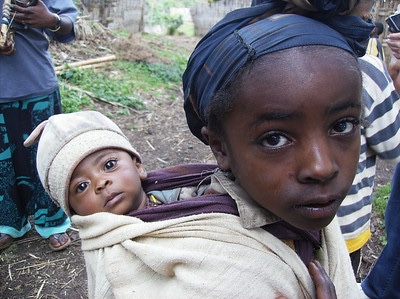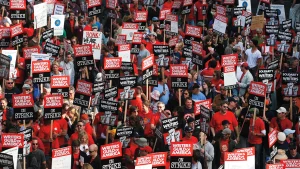The Devastation In Africa: War Between Ethiopia and Tigray Disrupts Millions of Lives

Used from Flickr under creative commons by Achilli Family
War in Tigray. Tigrayan citizens are leaving the region because of military forces occupying the village. A young girl carried her infant sibling out of the village and fled to Sudan.
November 1, 2021
Ethiopia is currently in a state of chaos, and its citizens are facing political upheaval, humanitarian issues, sexual violence, and imbalances between the Tigrayan and Ethiopian governments. The factions battling for political dominance are simultaneously destroying the lives of Ethiopian and Tigrayan citizens.
In 1994, Ethiopia’s government consisted of a federal system broken up into different regions controlled by 10 ethnic groups. Out of those groups, the Tigrayan People’s Liberation Front stood out because of how they influenced and attempted to gear the country towards more democratic views.
The group was an ethno-nationalist organization that worked in favor of democracy alongside other organizations and formed the Ethiopian People’s Revolutionary Democratic Front (EPRDF). Although the TPLF helped in the stabilization and construction of Ethiopia, citizens questioned if the future of Ethiopia was truly in good hands. Eventually, citizens raised concerns about their human rights and level of Democracy.
Since 1991, TPLF ruled the Tigrayan region and asserted its power over Ethiopia until the government adopted a new system: the federal parliamentary republic. The contemporary system appointed a prime minister, Abiy Ahmed, in 2018; as a result, the abrupt change in government caused tension between the Tigrayan group and Abiy. Eventually, this tension erupted into a war over whether or not political reforms should be established in Ethiopia.
On September 9th, 2020, the region of Tigray violated Ethiopia’s election system and held unlawful elections for the Tigray Regional Assembly (TRA). Because Ethiopia’s government had delayed its own elections due to COVID-19, the prime minister opposed the TRA’s decision and severed all relations with Tigray.
Following this event, Ahmed quickly initiated the call to war, which eventually led to a crisis between the region of Tigray and Ethiopia’s government. The history of this crisis dates back to the spread of the Tigrayan People’s Liberation Front; they dominated Ethiopia for almost three decades.
On November 4, 2020, Ahmed declared war on the Tigrayan People’s Liberation Front (TPLF) in Northern Tigray. The government of Ethiopia claimed that the people affiliated with TPLF attacked and destroyed their military base which housed soldiers.
Consequently, the region of Tigray initiated a call to war against the government of Ethiopia; Ahmed accused the Tigrayan forces of stealing military weapons, and prepared his regime for war on November 4, 2020. During this time, more than two million Tigrayan citizens escaped the country; thousands sought safety in Sudan after Abiy ordered a military invasion.
A combination of troops from Ethiopia, Amhara, and Eritrea “burned crops, occupied and looted homes, and committed extrajudicial killings”. Citizens who remained in Tigray suffered insurmountable damages such as sexual violence, attacks on schools, factories, and hospitals, and a lack of access to electricity.
However, amidst the turmoil and pandemonium, Tigrayan citizens are still fighting to become a sovereign nation. The region does not want to be associated with Ethiopians nor be a part of the country as a whole, so separatist groups in Tigray formed to protest the government to grant annexation and allow Tigray to become a new country.
Today, news of the fighting has spread across the world, and the United Nations World Food Programme (WFP) is focusing their attention even more on the food crisis in Tigray. WFP is providing food aid to Ethiopian citizens in Tigray because of the near-famine and deadly humanitarian concerns that have arisen there; the organization accepts and welcomes all donations for Ethiopian citizens.
The war in Tigray is far from over; residents are fleeing the country in hopes of finding shelter, but have run straight into famine. Thousands could end up dying from malnutrition. The initiation of war back in November of 2020 continues to the present day and leaves many Ethiopian citizens stuck in helpless situations.




